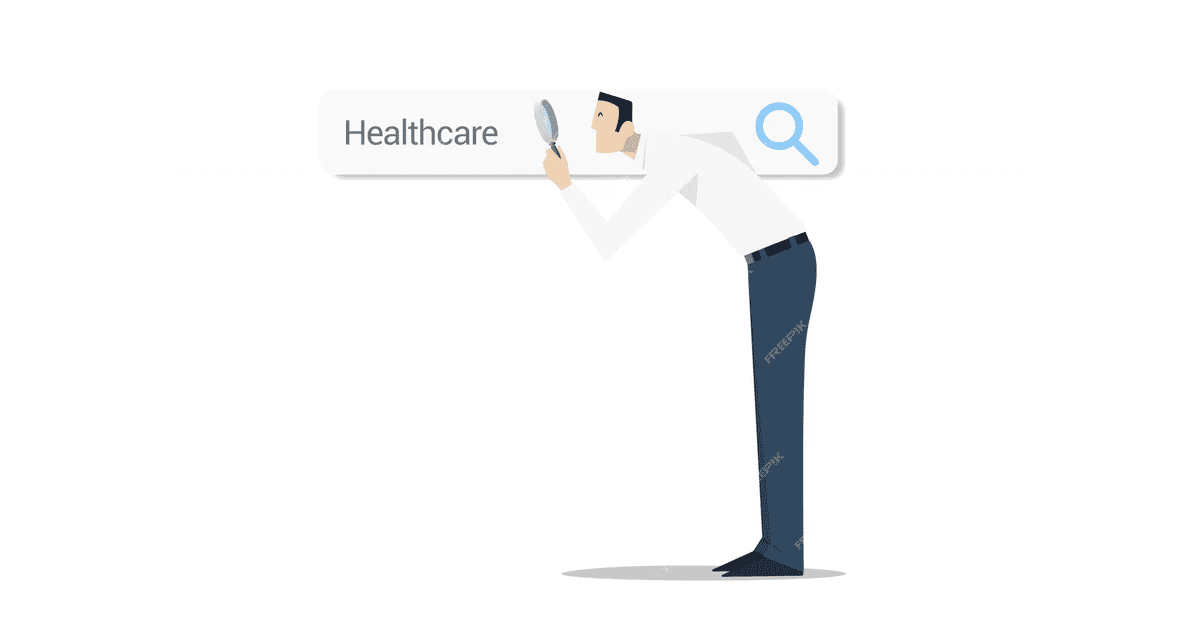6 Proven Healthcare SEO Strategies to Boost Your Search Ranking
You may not be familiar with SEO as a doctor. However, even if you did, it might only be a passing reference to this enormous subject, right?
Unexpectedly, though SEO is a bit of a mystery in the medical community, it’s a vital component to increasing your internet visibility, especially in the healthcare field. It awaits the ideal beat, akin to the pulse of your online persona in the healthcare SEO landscape.
We’re delving deep into straightforward yet effective healthcare SEO tactics in this book, designed particularly for you, the medical experts.
We’ll go over how to improve your practice’s web presence and draw in people who are looking for a physician that is similar to you through targeted healthcare SEO strategies.
Are you wearing scrubs now? Let’s get our hands dirty and explore the digital realm of healthcare SEO.
Table of content
- Local SEO
- Get More Internet Testimonials for Healthcare SEO
- Optimize the HTML Tags on Your Site
- Strengthen Link Building
- Technical Enhancement
- Performance tracking
What Benefits SEO Can Offer Doctors?
Being the primary component in a website’s search results ranking, healthcare SEO undoubtedly has many benefits. However, what are the general advantages of SEO for a healthcare company? Let’s examine some of the main advantages SEO offers to a business.
Enhancement of Patient Outreach:
SEO increases your internet presence, making it easier for potential patients to find your office and grow your healthcare practice.
Targeted Patient Traffic:
Draw in the proper crowd. It’s more probable that patients searching for your particular healthcare services will come across your website through optimized search results.
Healthcare’s Competitive Advantage:
In a crowded field, stand out. More exposure and recognition in your healthcare field of expertise correspond with higher search ranks.
Determining Medical Knowledge:
Give insightful and helpful healthcare advice. Patients gain knowledge from this, and it also demonstrates your professionalism and dependability in the healthcare sector.
Incorporate healthcare SEO into your practice’s growth strategy to connect with more patients, establish your expertise, and gain a competitive edge in healthcare.
1. Local SEO
If a doctor wants to draw in patients from the surrounding area, local SEO is crucial. Making your practice more discoverable to people in your community can be achieved by optimizing your web presence for local healthcare search results. Here are some tips for improving your local healthcare SEO:
Start with your “Google Business Profile” to claim your healthcare listings. In order for this profile to show up in local healthcare search results and maps, it must be claimed and updated.
Extend Practice & Doctor Information: Complete your Google Business Profile with comprehensive, current information about your healthcare practice and doctors, including services provided, hours of operation, and contact information.
Make Use of Local Listing Services: List your healthcare practice on local healthcare directories and listing websites in addition to Google. This increases the number of local patients who can find you online through healthcare search results.
Related [Optimize your HealthCare Website for local searches]
Make local keyword optimizations
- Use local keywords, such as the name of your city or area, in the content of your healthcare website.
- Assists search engines in recognizing your healthcare practice as pertinent to patients in the area.
- Makes it more likely to show up in local healthcare search results.

Local Seo is important to healthcare
Make Sure Your Website Is Mobile-Friendly
- Make your healthcare website mobile-friendly.
- Guarantee quick load times and simple navigation.
- Make it simple for prospective patients to obtain your healthcare information while they’re on the go.
2. Get More Internet Testimonials for Healthcare SEO
More than 60% of patients look up doctors online before scheduling a visit. Most healthcare search begin with reviews.
Obtaining favorable ratings on well-known search engines and review sites is one of the many ways healthcare professionals may enhance their healthcare profile.
See how online reviews affect the expansion of your healthcare practice by looking at these fascinating facts:
71% of patients start their search for a new healthcare physician by reading internet reviews.
For a provider with good reviews, 43% of patients would choose to go outside their healthcare insurance network.
Related[Using Patient Testimonials for Healthcare SEO]
Online reviews are used by 94% of patients to assess healthcare services.
Reviews are trusted by 84% of patients just as much as personal recommendations.
Doctors and healthcare physicians can utilize Demand Hub to do more than just use review sites for marketing.
Healthcare physicians can utilize Demand Hub to expand their patient base in addition to using review sites as marketing platforms, enhancing their healthcare SEO strategy.
Doctors’ Demand Hub with Demand Hub’s dynamic dashboard, you can assess various offline and online marketing techniques and keep an eye on Seo success rates. Any doctor who wants to increase overall patient happiness needs to use Demand Hub, especially for improving healthcare SEO in search results.
The Importance of Online Reviews for Healthcare Providers
- Positive reviews attract new healthcare patients.
- Builds trust and credibility in your healthcare practice.
- Influences patient choice significantly in healthcare search results.
- Encouraging reviews boosts online reputation in the healthcare industry.
Utilizing Demand Hub for Comprehensive Healthcare SEO
- Manage healthcare SEO and online reputation effectively.
- Track patient satisfaction with an easy-to-use healthcare dashboard.
- Identify areas for improvement in your healthcare practice.
- Implement targeted marketing strategies to grow your healthcare patient base.
3. Optimize the HTML Tags on Your Site
You can inform search engines about the topic of your healthcare website by using HTML tags. They provide a technical and aesthetic framework for your website, making it easier for users and search engines to comprehend the healthcare content.
One of the most crucial on-page SEO elements is HTML tags. The following three HTML tags are crucial:
Title tags: When a visitor lands on your healthcare website, their initial impression is formed by the title tag. It really shows up in the healthcare search results page (SERP) even before the user clicks on your link.
Make sure, therefore, that your title tags are proper, contain pertinent keywords, and don’t exceed 60 characters for optimal healthcare SEO in search results.

Meta tags play an important role in the healthcare Seo.
Tags for Title and Alt
Short summaries of your healthcare pages that show up in healthcare search results are called meta descriptions. They should also be between 155 and 160 characters in length, suitable, and contain pertinent keywords.
Headings
Headings facilitate reading for readers and assist Google in deciphering the organization of your healthcare material. From <h1> to <h6>, there are six heading tags; however, h1 and h2 are the most crucial for healthcare SEO.
Don’t overuse keywords in your headings; instead, use them sparingly to enhance search results.
The h2 and h3 headings on your healthcare website will appear as seen in the following image:
H1 and H2 Headings
For optimal SEO results, include your primary keywords in the titles and h1 tags. Depending on their search results, the secondary relevant keywords ought to be placed in the descending headings.
Depending on the content management system (CMS) you’re using—Wix, Drupal, WordPress, or another—you may add these tags with ease.
Should you remain uncertain, a straightforward Google search for “how to add healthcare content on (your CMS name)” might provide instructions to boost SEO.
4. Strengthen Link Building
Getting links from other websites to yours is known as link building, and it’s a crucial SEO tactic for healthcare websites.
Link building done strategically increases the authority and importance of your healthcare website within your industry in addition to its healthcare search results visibility.
Produce High-Quality Healthcare information:
Give special attention to producing healthcare information that is interesting, educational, and valuable. Your healthcare website becomes a more desirable connecting target as a result. You can do industry-wide research on hot healthcare subjects with the aid of resources like Buzz Sumo.

Backlinks are an important to rank higher in search results
Guest Blogging:
Guest blogging is the practice of submitting content to other respectable healthcare websites within your business.
This helps you build your authority in addition to giving you healthcare backlinks. One useful tool for finding possible guest posting healthcare websites is Ahrefs.
Use Link Building Tools: To locate link building chances, tools such as SEMrush and Moz Link Explorer are essential. They assist in locating possible websites that could link to your healthcare material as well as the sources of links that your rivals are using.
Participate Actively in Healthcare Community Forums: Take part in industry-related forums and discussion groups.
This does not imply link-spamming; rather, it means making valuable contributions and including connections to your healthcare content when it advances the conversation.
Rather than focusing only on the amount of connections, link building is more effective when the links are of high quality and relevance in healthcare. I
t all comes down to establishing trust and offering value so that you can obtain beneficial backlinks for better search results.
Related [Improves Your Healthcare SEO with Quality Backlinks]
Key Metrics to Monitor
Where’s the Traffic? See if healthcare visitors find you via Google, social media, etc.
Keyword Wins and Oops: Which healthcare keywords are your superstars in search results, and which need a boost?
Backlink Check: Quality over quantity always. Who’s linking to your healthcare site?
Top Tools for the Job
Google Analytics: Your go-to for understanding healthcare visitor behavior in search results. Free and insightful!
Google Search Console: Get the lowdown on how you appear in Google healthcare Search.
SEMrush: A multi-tool wonder for keywords, site health, and spying on competitors in healthcare SEO.
Ahrefs: The backlink boss in SEO. Plus, ace your keyword game and peek at competitors’ search results.
Moz Pro: Your healthcare SEO Swiss Army knife. From site fixes to keyword gems for search results.
It’s not just about collecting data. It’s about making sense of it and taking action. Use these tools to steer your healthcare SEO ship in the right direction, targeting improved search results!
5. Technical Enhancement
Simple changes can be made to your healthcare website to make it safer and function better for all healthcare users. Let’s investigate those essential technological elements for SEO.
Core Web Vitals:
These are important indicators of your healthcare website’s effectiveness. They concentrate on three key areas: The speed at which your healthcare website loads. Inter
activity: The speed at which user interactions are handled by your healthcare website. Visual Stability: The steadiness with which your healthcare website loads.
Simplify URLs:
Make sure your healthcare URLs are descriptive, clear, and brief. Search engines and healthcare consumers can both grasp simple URLs more easily. Use /about-us, for instance, rather than /page1/section2/about.

Technical Enhancement is important for Seo
Boost Healthcare Site Security & Speed:
To make your healthcare website load faster, reduce server response time, use browser caching, and optimize images.
To safeguard user data and your healthcare website, utilize HTTPS. To avoid security lapses, make sure your software is updated on a regular basis and use strong passwords.
Improve Usability on Mobile
- Make Sure Your Healthcare Website Is Mobile-Responsive: Verify that your healthcare website is truly responsive, adapting to various screen sizes with ease.
- Use Legible Font Sizes: Healthcare users shouldn’t have to zoom in to read text on smaller screens.
- Optimize Touch Elements: On mobile devices, buttons and links should be large enough and spaced out sufficiently to be readily tapped in healthcare search results.
- Minimize Pop-Ups: Minimize the invasive pop-ups that annoy healthcare mobile users.
Boost The Usability of Healthcare Website Navigation
- Implement Clear Menus: Create healthcare menus that are simple to use and straightforward, guiding people to the information they need fast.
- Use Breadcrumbs: Include a breadcrumb navigation system to make it easier for healthcare visitors to understand where they are on your website and to return to earlier sections.
- Optimize Internal Linking: Make sure your healthcare internal links point to worthwhile content and are pertinent.
- Every one of these components is essential to enhancing the functionality, user experience, and healthcare SEO of your website for better search results.
6. Performance tracking
Keeping an Eye on Traffic, Conversions, and Healthcare Website Visibility
Measuring performance is essential to figuring out how efficient your SEO for doctors is.
You may learn more about how healthcare patients find and use your healthcare website by tracking measures like traffic, conversion rates, and website visibility.
With the abundance of data provided by tools like Google Analytics and Google Search Console, you can monitor which healthcare pages are the most popular, which healthcare keywords are bringing in the most traffic, and how people are interacting with your healthcare website.
By examining this data, you may enhance performance and return on investment by fine-tuning your healthcare SEO strategy for search results.
By ensuring that your SEO efforts are in line with your objectives, regular performance monitoring will help you expand your healthcare practice and draw in more patients.
Monitoring healthcare performance statistics takes a lot of time. Fortunately, healthcare SEO experts can simplify this procedure by gathering important healthcare performance information from multiple sources and compiling it into an easy-to-read report.
This guarantees that you are always aware of the healthcare performance of your website, including your main lead sources and current healthcare keyword rankings in search results.
Healthcare SEO Advice for Doctors:
Improving the healthcare user journey requires an understanding of how healthcare users interact with your website and what they do before making an appointment.
The healthcare website’s content and structure can be specifically improved by identifying sections that perform well and those that require work through the analysis of user behavior and conversion channels.
Utilizing a Healthcare SEO Agency
For healthcare Doctors who want to improve their internet presence without taking time away from their main responsibility of providing patient care, working with a healthcare SEO service can be a game-changer.
A seasoned healthcare SEO company offers a wealth of expertise and specialized abilities in SEO for doctors, customizing tactics to fit the particular requirements of the healthcare sector.
They are capable of managing all tasks, including technological optimization, performance monitoring, and keyword research and healthcare content production.
Working with a healthcare SEO service ensures that your healthcare practice establishes and maintains a strong online presence by providing you with ongoing support and professional experience.
With our collaboration, you can concentrate on giving your patients the best healthcare possible and leave the complicated aspects of healthcare SEO to the professionals.

